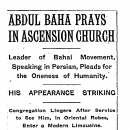Main menu
- ‘Abdu’l-Bahá’s Journey
- World Peace
- Stopping Racism in America
- Empowerment of Women
- More Principles...
- Prayer for America
‘Abdu’l-Bahá Prays in Ascension Church
Leader of Bahá’í Movement, Speaking in Persian, Pleads for the Oneness of Humanity.
HIS APPEARANCE STRIKING
Congregation Lingers After Service to See Him, In Oriental Robes, Enter a Modern Limousine.
In the Church of the Ascension, toward the close of the services, yesterday morning the big congregation knelt in the pews or stood in the aisle spaces with heads reverently bowed, and before the altar Dr. Percy Stickney Grant and his assistant, Mr. Underhill, knelt, while a venerable white-bearded Persian, clothed in his linen gaba and wearing his fez and his patriarch’s tabouch, stood and offered up a prayer in his native tongue. This was Abbas Effendi, or, as his followers call him, ‘Abdu’l-Bahá Abbas, the Persian philosopher and interpreter of the Bahá’í revelation, who has come to this country to speak at the Lake Mohonk Peace Conference the latter part of this month and to spread his gospel of the fundamental unity of all religions.
Dr. Grant was not the first clergyman to invite the Persian teacher, but his was the first invitation that ‘Abdu’l-Bahá accepted, and there was little room left in Ascension Church when the 11 o’clock services began yesterday. As they progressed the venerable Persian took his place in the high-backed seat to the right of the altar, with Dr. Ammen Fareend, his nephew, standing by, ready to act as interpreter.
“It is to be our privilege this morning,” said Dr. Grant, “to hear one who has come out of the East, a new and great herald of good-will, one bearing a message of love to all mankind. ‘Abdu’l-Bahá Abbas is a master of the things of the spirit. He comes from that part of the world where men meditate, where contemplation was born. He teaches the fundamental unity of all religions — a truth in which this congregation believes profoundly — and we welcome here one who may help the material fervor of the Occident to gain a new peace by the infiltration of the harmonies of the Orient.”
‘Abdu’l-Bahá spoke in Persian, with Dr. Fareend interpreting a phrase at a time. Our material civilization, the Persian teacher said, has progressed greatly with the perfection of the crafts and the forward steps of material science, but our spiritual civilization, that which is based on divine morals, has declined and become degraded. We should strive, he said, to make our material civilization the purest possible medium, the most unclouded glass, through which the light of our spiritual civilization must shine.
One of the things that supports a spiritual civilization is peace, he said, and the body politic is in need of universal peace, but the oneness of humanity, the human solidarity, which has been the message of all the prophets, will be achieved only through the spiritual power, for neither racial distinctions nor patriotism can further it. The oneness of humanity will come with the supremacy of the spiritual civilization, and not while, as now, we are submerged in a sea of materialism. The cause is progressing in the Orient, he concluded, and the heavenly civilization is daily making itself more manifest.
These things ‘Abdu’l-Bahá said in the few moments that he spoke, before he returned to his seat beside the altar. While the offering was being taken those seated near the front could see him delving amid his robes, and finally his hand emerged with a bill that found its way to the plate. During the prayer he stood with his forearms extended, the palms of his hands turned upward, and as he finished he passed these over his eyes in a gesture that ended with the stroking of the patriarchal beard. A sense of the strangeness of the scene seemed to be with many in the congregation, and not a few lingered afterward to see the Persian philosopher, in his costume of the Orient, as he stepped into a modern Occidental limousine, to be whizzed uptown to his apartment at the Ansonia.
‘Abdu’l-Bahá spoke yesterday afternoon at the meeting of the New Thought Society in the Carnegie Lyceum, and on Wednesday afternoon he will receive those of his followers who have come from distant places to see him.









